汉译英句子翻译原则
- 格式:doc
- 大小:55.50 KB
- 文档页数:10
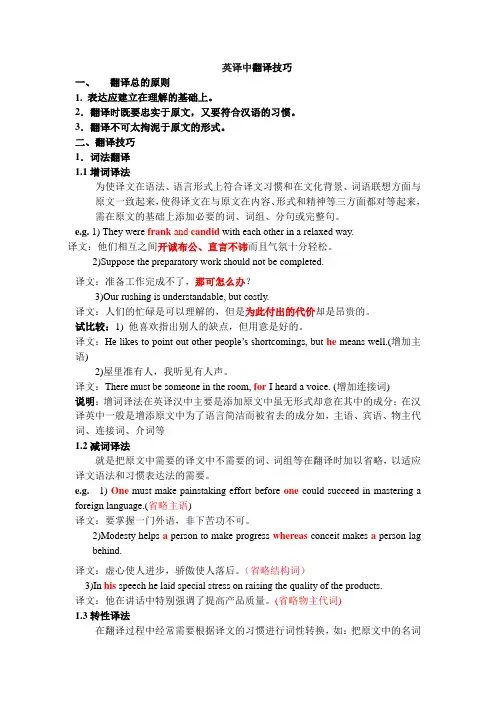
英译中翻译技巧一、翻译总的原则1. 表达应建立在理解的基础上。
2.翻译时既要忠实于原文,又要符合汉语的习惯。
3.翻译不可太拘泥于原文的形式。
二、翻译技巧1.词法翻译1.1增词译法为使译文在语法、语言形式上符合译文习惯和在文化背景、词语联想方面与原文一致起来,使得译文在与原文在内容、形式和精神等三方面都对等起来,需在原文的基础上添加必要的词、词组、分句或完整句。
e.g. 1) They were frank and candid with each other in a relaxed way.译文:他们相互之间开诚布公、直言不讳而且气氛十分轻松。
2)Suppose the preparatory work should not be completed.译文:准备工作完成不了,那可怎么办?3)Our rushing is understandable, but costly.译文:人们的忙碌是可以理解的,但是为此付出的代价却是昂贵的。
试比较:1) 他喜欢指出别人的缺点,但用意是好的。
译文:He likes to point out other people’s shortcomin gs, but he means well.(增加主语)2)屋里准有人,我听见有人声。
译文:There must be someone in the room, for I heard a voice. (增加连接词)说明:增词译法在英译汉中主要是添加原文中虽无形式却意在其中的成分;在汉译英中一般是增添原文中为了语言简洁而被省去的成分如,主语、宾语、物主代词、连接词、介词等1.2减词译法就是把原文中需要的译文中不需要的词、词组等在翻译时加以省略,以适应译文语法和习惯表达法的需要。
e.g. 1)One must make painstaking effort before one could succeed in mastering a foreign language.(省略主语)译文:要掌握一门外语,非下苦功不可。
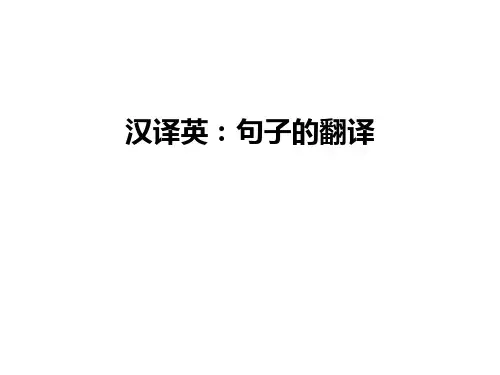
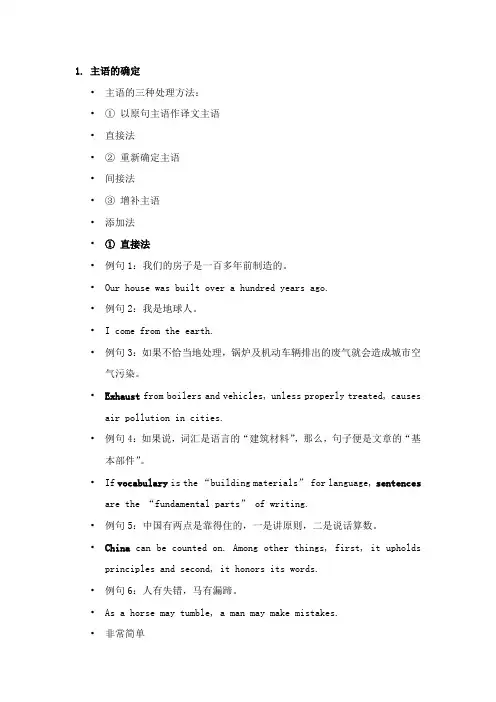
1. 主语的确定•主语的三种处理方法:•①以原句主语作译文主语•直接法•②重新确定主语•间接法•③增补主语•添加法•①直接法•例句1:我们的房子是一百多年前制造的。
•Our house was built over a hundred years ago.•例句2:我是地球人。
•I come from the earth.•例句3:如果不恰当地处理,锅炉及机动车辆排出的废气就会造成城市空气污染。
•Exhaust from boilers and vehicles, unless properly treated, causes air pollution in cities.•例句4:如果说,词汇是语言的“建筑材料”,那么,句子便是文章的“基本部件”。
•If vocabulary is the “building materials” for language, sentences are the “fundamental parts” of writing.•例句5:中国有两点是靠得住的,一是讲原则,二是说话算数。
•China can be counted on. Among other things, first, it upholds principles and second, it honors its words.•例句6:人有失错,马有漏蹄。
•As a horse may tumble, a man may make mistakes.•非常简单•文化差异•应用有限•②间接法•中英文表达的习惯不同•语言地道,句式多样•例句7:世纪之交,中国外交空前活跃。
•译法1(直接法):At the turn of the century, China is very active in its diplomatic activities.•译法2(间接法):The turn of the century finds China most active on the diplomatic arena.•例句8:1964年十月中国爆炸了第一颗原子弹,使世界大为震惊。
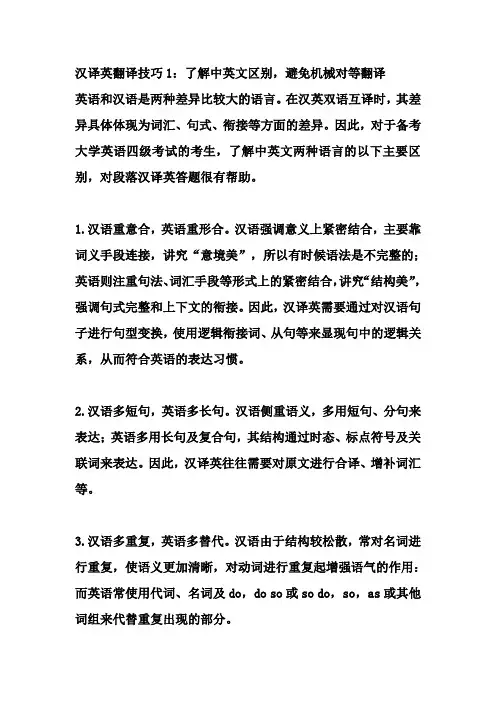
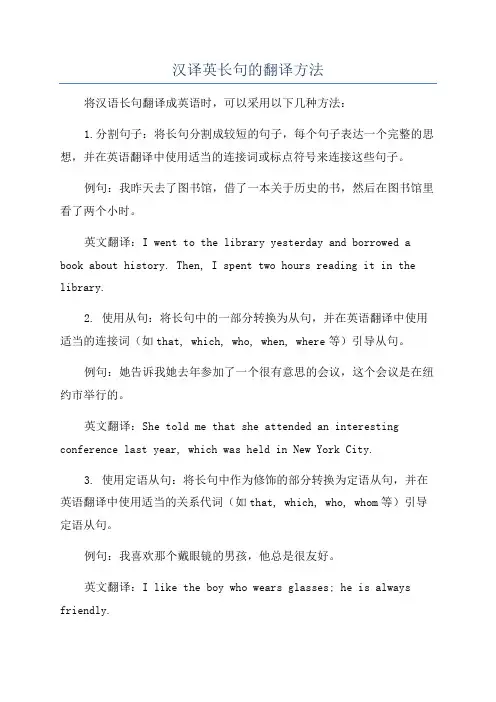
汉译英长句的翻译方法将汉语长句翻译成英语时,可以采用以下几种方法:1.分割句子:将长句分割成较短的句子,每个句子表达一个完整的思想,并在英语翻译中使用适当的连接词或标点符号来连接这些句子。
例句:我昨天去了图书馆,借了一本关于历史的书,然后在图书馆里看了两个小时。
英文翻译:I went to the library yesterday and borrowed a book about history. Then, I spent two hours reading it in the library.2. 使用从句:将长句中的一部分转换为从句,并在英语翻译中使用适当的连接词(如that, which, who, when, where等)引导从句。
例句:她告诉我她去年参加了一个很有意思的会议,这个会议是在纽约市举行的。
英文翻译:She told me that she attended an interesting conference last year, which was held in New York City.3. 使用定语从句:将长句中作为修饰的部分转换为定语从句,并在英语翻译中使用适当的关系代词(如that, which, who, whom等)引导定语从句。
例句:我喜欢那个戴眼镜的男孩,他总是很友好。
英文翻译:I like the boy who wears glasses; he is always friendly.4.利用省略:可以在英语翻译中省略一些不重要或重复的信息,使句子更清晰和简洁。
例句:我昨天和朋友一起去了看电影,然后吃了晚饭。
英文翻译:I went to watch a movie with my friends yesterday and had dinner afterwards.以上是一些常用的翻译方法,根据具体语境和句子结构的复杂程度,可以选择适合的方法进行翻译。
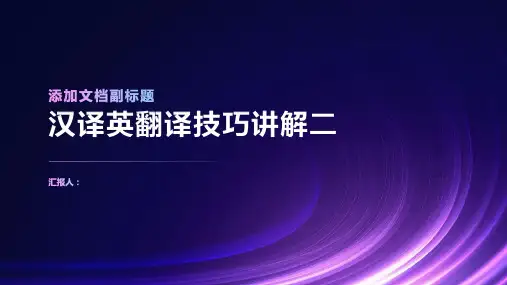
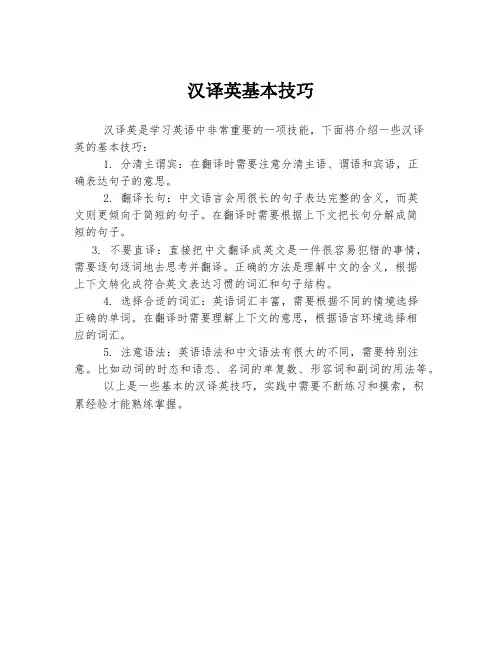
汉译英基本技巧
汉译英是学习英语中非常重要的一项技能,下面将介绍一些汉译
英的基本技巧:
1. 分清主谓宾:在翻译时需要注意分清主语、谓语和宾语,正
确表达句子的意思。
2. 翻译长句:中文语言会用很长的句子表达完整的含义,而英
文则更倾向于简短的句子。
在翻译时需要根据上下文把长句分解成简
短的句子。
3. 不要直译:直接把中文翻译成英文是一件很容易犯错的事情,需要逐句逐词地去思考并翻译。
正确的方法是理解中文的含义,根据
上下文转化成符合英文表达习惯的词汇和句子结构。
4. 选择合适的词汇:英语词汇丰富,需要根据不同的情境选择
正确的单词。
在翻译时需要理解上下文的意思,根据语言环境选择相
应的词汇。
5. 注意语法:英语语法和中文语法有很大的不同,需要特别注意。
比如动词的时态和语态、名词的单复数、形容词和副词的用法等。
以上是一些基本的汉译英技巧,实践中需要不断练习和摸索,积
累经验才能熟练掌握。
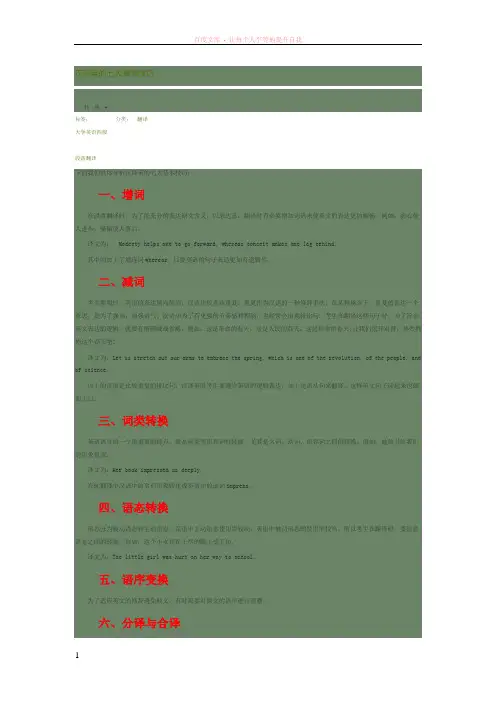
汉译英的七大基本技巧:(2014-10-27 09:27:53)转载▼分类:翻译标签:大学英语四级段落翻译下面我们具体分析汉译英的七大基本技巧:一、增词在段落翻译时,为了能充分的表达原文含义,以求达意,翻译时有必要增加词语来使英文的表达更加顺畅。
例如:虚心使人进步,骄傲使人落后。
译文为:Modesty helps one to go forward, whereas conceit makes one lag behind.其中间加上了增连词whereas,以使英语的句子表达更加有逻辑性。
二、减词考生要明白,英语的表达倾向简洁,汉语比较喜欢重复,重复作为汉语的一种修辞手法,在某种场合下,重复的表达一个意思,是为了强调,加强语气。
汉语中为了有更强的节奏感和押韵,也经常会出现排比句。
考生在翻译这些句子时,为了符合英文表达的逻辑,就要有所删减或省略。
例如:这是革命的春天,这是人民的春天,这是科学的春天!让我们张开双臂,热烈拥抱这个春天吧!译文为:Let us stretch out our arms to embrace the spring, which is one of the revolution, of the people, and of science.以上的汉语是比较重复的排比句,汉译英时考生要遵守英语的逻辑表达,加上定语从句来翻译,这样英文句子读起来也朗朗上口。
三、词类转换英语语言的一个很重要的特点,就是词类变形和词性转换,尤其是名词、动词、形容词之间的转换。
例如:她的书给我们的印象很深。
译文为:Her book impressed us deeply.在此翻译中汉语中的名词印象转化成英语中的动词impress。
四、语态转换语态分为被动语态和主动语态,汉语中主动语态使用率较高,英语中被动语态的使用率较高。
所以考生在翻译时,要注意语态之间的转换。
例如:这个小女孩在上学的路上受了伤。
译文为:The little girl was hurt on her way to school.五、语序变换为了适应英文的修辞避免歧义,有时需要对原文的语序进行调整。
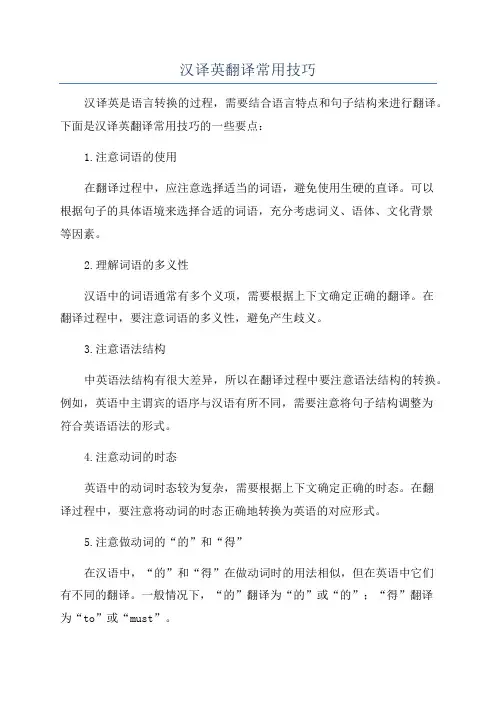
汉译英翻译常用技巧汉译英是语言转换的过程,需要结合语言特点和句子结构来进行翻译。
下面是汉译英翻译常用技巧的一些要点:1.注意词语的使用在翻译过程中,应注意选择适当的词语,避免使用生硬的直译。
可以根据句子的具体语境来选择合适的词语,充分考虑词义、语体、文化背景等因素。
2.理解词语的多义性汉语中的词语通常有多个义项,需要根据上下文确定正确的翻译。
在翻译过程中,要注意词语的多义性,避免产生歧义。
3.注意语法结构中英语法结构有很大差异,所以在翻译过程中要注意语法结构的转换。
例如,英语中主谓宾的语序与汉语有所不同,需要注意将句子结构调整为符合英语语法的形式。
4.注意动词的时态英语中的动词时态较为复杂,需要根据上下文确定正确的时态。
在翻译过程中,要注意将动词的时态正确地转换为英语的对应形式。
5.注意做动词的“的”和“得”在汉语中,“的”和“得”在做动词时的用法相似,但在英语中它们有不同的翻译。
一般情况下,“的”翻译为“的”或“的”;“得”翻译为“to”或“must”。
6.使用适当的连词在汉译英翻译中,使用适当的连词能够使句子更加流畅。
常用的连词有“but”、“and”、“or”等。
根据句子的逻辑关系和语境,选择合适的连词来进行翻译。
7.注意上下文的衔接在翻译过程中,要注意将上下文的信息进行衔接,以确保翻译准确传达原文的意思。
在处理复杂句子时,要注意将上下文中的重要信息和语法结构准确地表达出来。
8.考虑文化差异汉英翻译中需要考虑不同文化背景对表达方式的影响。
在翻译过程中,要注意在尊重原文的同时,将信息准确传达给目标读者。
9.使用合适的术语和行业词汇根据具体领域的需求,要选择合适的术语和行业词汇。
在翻译过程中,要了解所涉及领域的专业术语,确保翻译的准确性和专业性。
10.多加练习翻译是一项技能,需要通过不断的练习来提高。
多进行汉译英的练习,积累翻译经验,提高翻译的准确性和流利度。
总之,汉译英的翻译技巧是一个不断学习和掌握的过程,通过不断的练习和积累,可以提高翻译的准确性和质量。
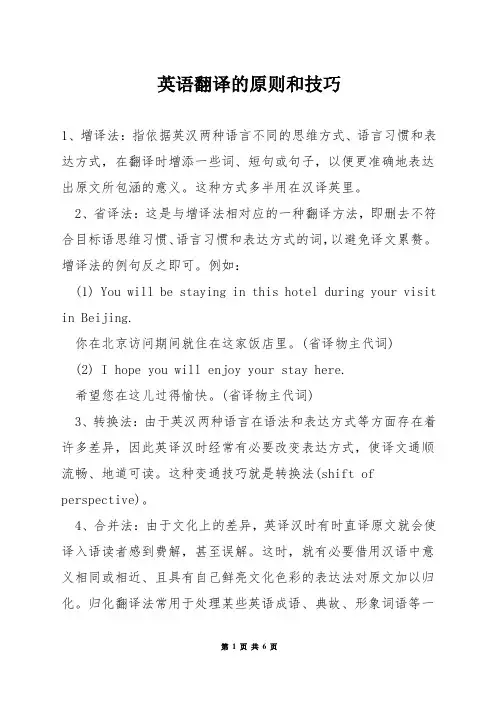
英语翻译的原则和技巧1、增译法:指依据英汉两种语言不同的思维方式、语言习惯和表达方式,在翻译时增添一些词、短句或句子,以便更准确地表达出原文所包涵的意义。
这种方式多半用在汉译英里。
2、省译法:这是与增译法相对应的一种翻译方法,即删去不符合目标语思维习惯、语言习惯和表达方式的词,以避免译文累赘。
增译法的例句反之即可。
例如:(1) You will be staying in this hotel during your visit in Beijing.你在北京访问期间就住在这家饭店里。
(省译物主代词)(2) I hope you will enjoy your stay here.希望您在这儿过得愉快。
(省译物主代词)3、转换法:由于英汉两种语言在语法和表达方式等方面存在着许多差异,因此英译汉时经常有必要改变表达方式,使译文通顺流畅、地道可读。
这种变通技巧就是转换法(shift of perspective)。
4、合并法:由于文化上的差异,英译汉时有时直译原文就会使译入语读者感到费解,甚至误解。
这时,就有必要借用汉语中意义相同或相近、且具有自己鲜亮文化色彩的表达法对原文加以归化。
归化翻译法常用于处理某些英语成语、典故、形象词语等一类文化色彩较浓的表达方式。
恰倒好处地归化可以使译文地道简洁、生动活泼,便于译入语读者理解和接受。
翻译技巧的掌握帮助我们更好融入世界,翻译为我们搭起了各国之间的桥梁,翻译也越来越引起人们的重视。
为了培养更多的翻译人才,中国外文局教育培训中心始终保持专业、革新、开放的理念,精心打造全国复合型国际化人才培养施行基地和全国跨语言跨文化培训服务综合平台,为中国走向世界架桥铺路,为实现"中国梦'努力奉献。
2英语翻译学习技巧注意事项一. 翻译的技巧没有技巧,只有一个熟字。
华罗庚说过,"苦干猛干埋头干,熟能生出百巧来'。
语法根基深厚,词汇量大,对专业词汇掌握得熟,自然就能驾轻就熟,怎么玩儿怎么转。
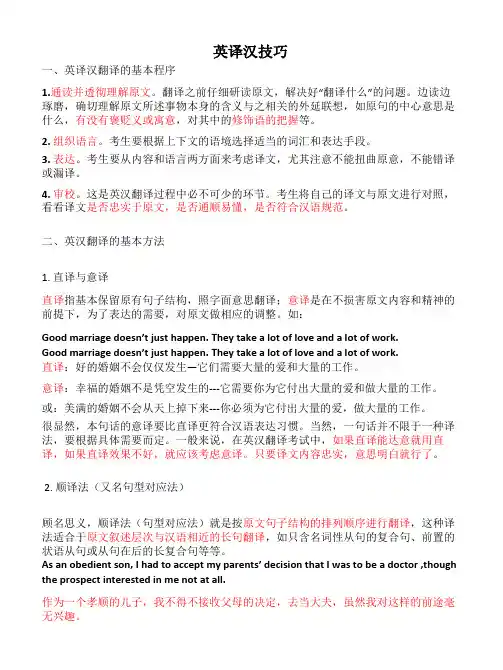
英译汉技巧一、英译汉翻译的基本程序1.通读并透彻理解原文。
翻译之前仔细研读原文,解决好“翻译什么”的问题。
边读边琢磨,确切理解原文所述事物本身的含义与之相关的外延联想,如原句的中心意思是什么,有没有褒贬义或寓意,对其中的修饰语的把握等。
2. 组织语言。
考生要根据上下文的语境选择适当的词汇和表达手段。
3. 表达。
考生要从内容和语言两方面来考虑译文,尤其注意不能扭曲原意,不能错译或漏译。
4. 审校。
这是英汉翻译过程中必不可少的环节。
考生将自己的译文与原文进行对照,看看译文是否忠实于原文,是否通顺易懂,是否符合汉语规范。
二、英汉翻译的基本方法1. 直译与意译直译指基本保留原有句子结构,照字面意思翻译;意译是在不损害原文内容和精神的前提下,为了表达的需要,对原文做相应的调整。
如:Good marriage doesn’t just happen. They take a lot of love and a lot of work.Good marriage doesn’t just happen. They take a lot of love and a lot of work.直译:好的婚姻不会仅仅发生—它们需要大量的爱和大量的工作。
意译:幸福的婚姻不是凭空发生的---它需要你为它付出大量的爱和做大量的工作。
或:美满的婚姻不会从天上掉下来---你必须为它付出大量的爱,做大量的工作。
很显然,本句话的意译要比直译更符合汉语表达习惯。
当然,一句话并不限于一种译法,要根据具体需要而定。
一般来说,在英汉翻译考试中,如果直译能达意就用直译,如果直译效果不好,就应该考虑意译。
只要译文内容忠实,意思明白就行了。
2. 顺译法(又名句型对应法)顾名思义,顺译法(句型对应法)就是按原文句子结构的排列顺序进行翻译,这种译法适合于原文叙述层次与汉语相近的长句翻译,如只含名词性从句的复合句、前置的状语从句或从句在后的长复合句等等。
汉译英句子的翻译专题1. 主语的确定•主语的三种处理方法:•①以原句主语作译文主语•直接法•②重新确定主语•间接法•③增补主语•添加法•①直接法•例句1:我们的房子是一百多年前制造的。
•Our house was built over a hundred years ago.•例句2:我是地球人。
•I come from the earth.•例句3:如果不恰当地处理,锅炉及机动车辆排出的废气就会造成城市空气污染。
•Exhaust from boilers and vehicles, unless properly treated, causes air pollution in cities.•例句4:如果说,词汇是语言的“建筑材料”,那么,句子便是文章的“基本部件”。
•If vocabulary is the “building materials”for language, sentences are the “fundamental parts”of writing.•例句5:中国有两点是靠得住的,一是讲原则,二是说话算数。
•China can be counted on. Among other things, first, it upholds principles and second, it honors its words.•例句6:人有失错,马有漏蹄。
•As a horse may tumble, a man may make mistakes.•非常简单•文化差异•应用有限•②间接法•中英文表达的习惯不同•语言地道,句式多样•例句7:世纪之交,中国外交空前活跃。
•译法1(直接法):At the turn of the century, China is very active in its diplomatic activities.•译法2(间接法):The turn of the century finds China most active on the diplomatic arena.•例句8:1964年十月中国爆炸了第一颗原子弹,使世界大为震惊。
汉译英分句的翻译技巧汉译英分句的翻译技巧汉语通常强调意合,其分句之间往往只有意思的关联,而没有显见的连接词语。
英语则强调形合,其句中的诸多信息需要由各种连接词连接在一起。
因此,汉译英的一个重要技巧就是要把汉语分句译为逻辑严谨、连接紧密的英语长句,即做好分句之间的连接。
下面为大家带来汉译英分句的翻译技巧,快来看看吧。
汉译英分句的翻译技巧11、利用状语从句汉译英时需理顺汉语各分句之间的逻辑关系,以下几种汉语分句通常可以转化为状语从句:其一,表示伴随状态、时间等的汉语分句,一般可通过添加when、while、as、after、before等连接词处理为时间状语从句;其二,表示原因的汉语分句,可通过添加since、as、because、for等连接词处理为原因状语从句;其三,表示结果的汉语分句,可通过添加so that或“so … that…”结构处理为结果状语从句;其四,表示让步关系的汉语分句,可通过添加though、although等连接词,译为让步状语从句;其五,表示条件、假设的汉语分句,可通过添加if、as soon as等连接词,译为条件状语从句。
我们来看下面的例句。
例1:新年钟声敲响,中华大地上空爆竹声震响天宇。
参考译文:When the bell rings for the New Year, loud firecrackers are set off all over China.注解:原文第一个分句表示时间,汉译英时可为其添加连接词when,将其译为时间状语从句,将第二个分句译为主句。
例2:九寨沟是如此美丽神奇,难怪游人都喜欢。
参考译文:The Jiuzhai Valley is so picturesque and marvelous that visitors can’t help loving it.注解:原文后一个分句是前一个分句的结果,汉译英时可以用“so … that …”来连接两个分句,以体现其因果关系。
关于汉译英的译法总结英译汉与汉译英有两个重要的问题:增词/减词;词性转换。
我们知道学习英语翻译首先要搞清英语与汉语的语言差异,这与中西方文化的差异有很大的关系,我们没有太多时间去完全掌握西方的文化背景,在这里总结了一下在汉译英时所翻译出来的英语应具备的特点:1、句式结构为:废话+主语+主要的话+废话,所以在汉译英时,当多个分句进行组合时需要找出主要矛盾,次要矛盾;2、善用长句,不用标点。
在进行汉译英是多为合译,中文短句通过一定的介词连词进行句子组合;3、善用连词,英语为形合式语言,句与句之间善用连词连接,句子多为长句;4、善用名词、形容词。
英文属弱势语言,善用弱势动词,因此汉译英的关键点在于找出最重要的动词,将中文中的强势动词进行弱势动词的过渡,一个地道的英文句子中动词越少越好;5、善用代词。
中文中善用名词或者名词省略,而英文中多用代词指代;6、常用标点符号:“; : -”7、评论性语句顺序为先评论再事实;8、语言结构为先总后分;9、善用表语从句、主语从句、同位语从句,而中文善用宾语从句。
如,我记得:the memory of….(表语从句);what I remembered is t hat…(主语从句)汉译英翻译步骤:1、断句。
中文句子较短,首先判断哪些句子应该放在一起翻译。
2、找动词(核心谓语动词)。
判断句子中哪个动词重要,哪个不重要。
3、找连词(在多个分句同时存在时使用);4、翻译;5、重读。
英文句式特点:1.主谓搭配问题(平衡)中文由于强调句子中的某个成分主语较长,谓语、宾语较短,而英文的主谓宾分配比较均匀,没有固定的强调结构。
我们也称中文为“非平衡性语言”,英文为“平衡性语言”。
如,中国的海洋资源十分丰富。
译为:China is rich in marine resource.而不是译为:China’s marine resource are very rich.2.评论与事实(先评论后事实)翻译时,英文是先评论后事实。
AcademicEditionMar.2011Vol.8No.1College English 汉译英中的准确翻译原则马家泰(中国地质大学,北京100083)摘要:“准确”理解原文,“准确”斟词酌句,是作为一种服务的翻译工作的当然使命。
所谓“准确翻译”,是指尽量调动翻译书刊中的种种翻译方法,完整地转达原文的信息和文体特点,大到数据金额,小至引言括号,无论句长句短,不管好翻难翻,都应恪守职业道德,勤查多问,一丝不苟,准确理解,到位表达。
关键词:汉译英;准确翻译一﹑引言准确是翻译的灵魂,是翻译的生命线。
准确翻译要求译者将来源语的信息完整无误地传达给目标语读者。
具体说来,汉译英中的准确涉及主题准确﹑精神准确﹑论点准确﹑风格准确﹑词语准确﹑数字准确﹑表达准确等。
归根结底,准确的译文应同时保持原文的意义和风格。
准确翻译不仅是跨文化交际成功的保障,而且也是译者职业道德和专业水平的集中体现。
准确翻译不仅体现了译者对翻译事业的尊重和负责,而且也体现了译者对跨文化交际双方的尊重和负责。
但必须指出,笔者所言准确翻译并非那种完全不顾文化差异和读者理解接受程度的机械翻译﹑死译﹑硬译。
二﹑准确翻译的要求准确翻译中“准确”的依据是原文,但是译文的表达是否“准确”,却缺乏操作性比较强的裁决标准。
可以提出的明确要求,也许应当包括:1.认真负责,绝不误译漏译;2.勤查词典,比较多种译法;3.揣摩体会,力争译文到位;4.必须校勘,勿令刊后汗颜。
三﹑准确翻译的技巧1.用词恰当从微观层面上讲,译文中最常见﹑最严重的问题就在词汇选择上。
这包括选词时必须考虑到对应词的广狭﹑褒贬﹑修辞﹑具体与抽象等方面,也包括选择用词﹑增益﹑省略﹑词类的转换(例如名词与动词﹑形容词与名词的相互转化)等方面。
如一家公司的宣传材料中,“公司简介”﹑“公司结构”﹑“业务范围”﹑“公司历程”几个小标题都不算难词,但可能由于译者死扣词典,分别译为introduction ,structure ,range ,career ,从交际意义上讲没有一个是对的。
汉译英翻译技巧汉译英是翻译中的一个重要方向,也是一个相对来说较难的环节。
以下是一些汉译英的技巧,帮助你更好地翻译。
1. 理解上下文:在汉译英时,需要首先理解句子或段落所在的上下文,包括文化背景、语义关系等。
这样可以准确地翻译出作者的意图和观点。
避免字面翻译,要根据上下文合理转化。
2. 保持简洁:英语中通常使用简洁的表达方式,因此在翻译过程中要尽量减少冗余和重复的词语。
同时,要注意避免使用过于复杂的词汇和句子结构,保持句子简短,易于理解。
3. 注意动词时态:在汉译英中,需要根据上下文和句子的时态来选择合适的动词时态。
如果句子描述的是过去的事件或状态,应使用过去时;如果描述的是现在的事件或状态,应使用现在时;如果描述的是将来的事件或状态,应使用将来时。
4. 分清主谓宾关系:中文中主谓宾的顺序与英文中可能不同,所以要准确理解句子的主谓宾关系,正确表达出来。
主语通常出现在句子的开头,而宾语往往出现在动词之后。
5. 注意使用连词:英语中使用连词来连接不同的句子部分,以表达它们之间的逻辑关系。
因此,在汉译英时,要注意使用适当的连词,如and、but、or、however等,以确保句子之间的逻辑连贯。
6. 熟悉常用短语和惯用语:英语中有很多常用短语和惯用语,熟悉这些短语和惯用语能够使翻译更加自然和准确。
可以通过阅读英文书籍、新闻和文章来积累常用短语和惯用语。
7. 注意名词的单复数:英语中名词的单复数形式有很多规则,要注意根据上下文正确地使用单数或复数形式。
例如,当描述一般事实或抽象概念时,通常使用单数形式;当描述可数的事物时,使用复数形式。
8. 使用正确的词汇和词组:在翻译中,要选择准确的词汇和词组来表达原文的意思。
可以使用工具如在线词典或翻译软件来查找合适的词汇和词组。
9. 避免直译:汉译英时,要避免直译,尽量用英语习惯表达相同的意思。
直译通常会产生句子结构不通顺,语义混乱的问题。
要根据英语的表达习惯和习惯用法,选择合适的翻译方式。
汉译英句子的翻译专题1. 主语的确定•主语的三种处理方法:•①以原句主语作译文主语•直接法•②重新确定主语•间接法•③增补主语•添加法•①直接法•例句1:我们的房子是一百多年前制造的。
•Our house was built over a hundred years ago.•例句2:我是地球人。
•I come from the earth.•例句3:如果不恰当地处理,锅炉及机动车辆排出的废气就会造成城市空气污染。
•Exhaust from boilers and vehicles, unless properly treated, causes air pollution in cities.•例句4:如果说,词汇是语言的“建筑材料”,那么,句子便是文章的“基本部件”。
•If vocabulary is the “building materials”for language, sentences are the “fundamental parts”of writing.•例句5:中国有两点是靠得住的,一是讲原则,二是说话算数。
•China can be counted on. Among other things, first, it upholds principles and second, it honors its words.•例句6:人有失错,马有漏蹄。
•As a horse may tumble, a man may make mistakes.•非常简单•文化差异•应用有限•②间接法•中英文表达的习惯不同•语言地道,句式多样•例句7:世纪之交,中国外交空前活跃。
•译法1(直接法):At the turn of the century, China is very active in its diplomatic activities.•译法2(间接法):The turn of the century finds China most active on the diplomatic arena.•例句8:1964年十月中国爆炸了第一颗原子弹,使世界大为震惊。
•译法1:In October, 1964, China blasted its first atomic bomb, which shocked the rest of the world significantly.•译法2:China’s first atomic blast in October, 1964 was a great shock to the rest of the world.•例句9:胎又瘪了。
•译法1:We’ve got another flat tire.•译法2:Our tire is flat again.•例句10:人不可貌相,海水不可斗量。
•译法1:It is impossible to judge people from their appearance, and impossible to measure the ocean by pints.•译法2:We cannot judge people from their appearance, just as we cannot measure the ocean by pints.•回忆:海纳百川,有容乃大。
•③增补法•推敲语境•考虑英语语法习惯和行文的需要。
•例句11:沉默呵,沉默呵!不在沉默中爆发,就在沉默中灭亡。
•Silence, silence! Unless we burst out, we shall perish in this silence.•练习1:中国社会主义建设的航船将乘风破浪地驶向现代化的光辉彼岸。
•菜鸟级•The ship of China’s socialist construction will brave the wind and waves and sail to the glorious destination of modernization.•魔王级:•China will stride forward in building socialism, like a ship braving the wind and the waves, towards the glorious destination of modernization.•练习2:我们之间关系的发展使我们不仅成为亲密的朋友,而且成为兄弟。
•菜鸟级:•The development of our relations has made us not only close friends but brothers as well.•魔王级:•Our relations have so grown that bind us not only as close friends but also as brothers.•练习3:他心直口快,总是愿意和任何人交朋友,所以很快赢得了大家的信任。
•雏鸟级:•His outspokenness and readiness to make friends with anyone soon won their trust.•小妖级:•He was very outspoken and always ready to make friends with anyone, so he won their trust.•大师级:•He was so frank, outspoken and constantly willing to make friends with anyone that he soon won their trust.•练习4:中国的富强和发展不会对任何国家构成威胁。
•菜鸟级:•The strength, prosperity and development of China will pose no threat to any countries.•小妖级:• A strong, prosperous and developed China will pose no threat to any countries. •大师级:•The rest of the world will confront no threat from a strong, prosperous and developed China.•练习5:轻纺工业产品的花色品种增多,质量继续有所提高。
•菜鸟级•The designs and variety of light industrial and textile products have increased and their quality has continued to improve.•魔王级•Light industry and textile products are now available in better designs and quality and richer variety.•口译:楼的质量不好•The quality of the building is poor.•The building is not well built.•练习6:天有不测风云,人有旦夕祸福。
•Storms gather without warning in nature and bad luck befalls men overnight. •练习7:真是太荒谬了。
•It’s utterly absurd.•练习8:只有冷静才能成功。
•Success depends on calm minds.•练习9:端午节吃粽子。
•On the Dragon Boat Festival, people eat zongzi.•练习10:上海近几年发生的巨大变化赢得了全世界人民的赞叹。
•That Shanghai has changed greatly in recent years has won admiration from people all over the world.•从句做主语•The fact that …2. 谓语确定和主谓一致•谓语的确定基于表意的需要•例句1. 中国政府不干预香港特别行政区的事务。
•The Central Government has never intervened in the affairs of the HKSAR.•The Central Government has refrained from intervening in the affairs of the HKSAR.•例句2:中国的经济将融入世界经济的大潮。
•The economy of China will converge with that of the world economy.•The economy of China will merge into the tide of the world economy.•China will merge into the world tide in terms of economy.•例句3:这事到了现在,还是时时记起。
•Even now, I still often think about it.•Even now, this remains fresh in my memory.•例句4:在同新闻界谈话的时候,上海人使用越来越多的最高级形容词。
•You can hear Shanghai people using more and more adjectives of the superlative degree when they talk to the press.•When they talk to press, the Shanghai citizens use more and more adjectives of the superlative degree.•例句5:(颐和园)1900年遭八国联军破坏。
•The summer palace was reduced to ruins by the allied forces of the eight foreign powers in 1990.•The summer palace suffered ravage in the hands of the allied forces of the eight foreign powers in 1990.•例句6:她们逐渐地镇定下来,有了自信。